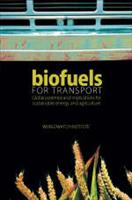Biofuels can significantly reduce the world’s dependence on oil, according to a publication forthcoming by the Worldwatch Institute and the German Agency for Technical Cooperation, sponsored by the German Federal Ministry of Food, Agriculture and Consumer Protection (BMELV) through the Agency of Renewable Resources (FNR).
The study was compiled in 2006 and results were discussed at at expert conferences in Berlin and Washington in May and June 2006. The publication also incorporates the findings of four country studies and policy dialogues completed by GTZ in Brazil, China, India and Tanzania as well as in Germany.
Earthscan publishers announces the study as follows:
- A unique global assessment of the potential opportunities and risks of biofuels
- A comprehensive analysis, which takes the reader from an introduction to specific biofuels, through the prospects for technology and agriculture, to the economic, social and environmental implications
- Explores and analyses the debates surrounding biofuels, offering authoritative conclusions
Biofuels for Transport is a unique and comprehensive assessment of the opportunities and risks of the large-scale production of biofuels, which demystifies complex questions and concerns, such as the food v. fuel debate. Global in scope, it is further informed by five country studies from Brazil, China, Germany, India and Tanzania.
The authors conclude that biofuels will play a significant role in our energy future, but warn that the large-scale use of biofuels carries risks that require focused and immediate policy initiatives.
Description of involved institutions
- BMELV is the German Ministry for Food, Agriculture and Consumer Protection
- FNR is the German Agency of Renewable Resources
- GTZ is an international cooperation enterprise for sustainable development with worldwide operations. GTZ operates in 126 countries worldwide
- The Worldwatch Institute is an independent research organization that focuses on innovative solutions to global environmental, resource, and economic problems.
 Contents
Contents
Preface • Executive Summary • Part I: Status and Global Trends • Status • Liquid Biofuels • First Generation Feedstock • Part II: New Technologies, Crops, and Prospects • Next Generation Feedstock • New Technologies • Long Term Production • Part III: Economic and Social Issues • Economic and Energy Security • Agriculture and Rural Development • International Trade • Part IV: Environmental Issues • Energy Balances • Greenhouse Gas Emissions and Climate Stability • Feedstock Production • Processing, Transport and Use • Part V: Market Introduction and Technology Strategies • Infrastructure • Vehicle and Engine Technologies • Transfer of Technology and Expertise • Part VI: The Policy Framework • Policies Around the World • Standards and Certification • Part VII: Recommendations • Part VIII: Country Studies • Appendices • Glossary of Terms • Bibliography
Bibliographic Details
Hardback £49.95
ISBN: 1844074226
Publication Date: April 2007
336 pages; 234×156 mm; Figures, tables, boxes, index
Order here: http://shop.earthscan.co.uk
Source
Deutsche Gesellschaft für Technische Zusammenarbeit (GTZ) GmbH, 2007-03-02.
Share
Renewable Carbon News – Daily Newsletter
Subscribe to our daily email newsletter – the world's leading newsletter on renewable materials and chemicals










